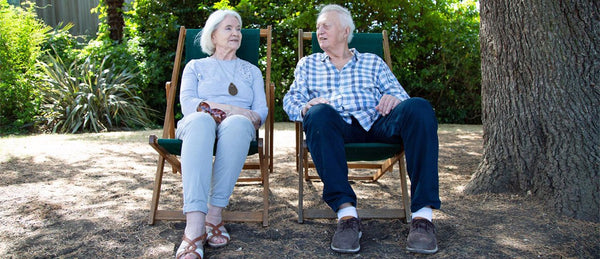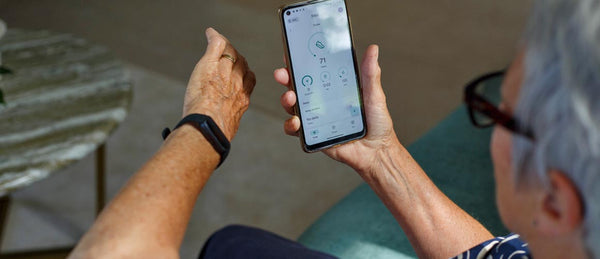In today's digital age, it's difficult to imagine a life without the internet and social media. Social media platforms, especially Instagram and Snapchat, have been quite favoured among the younger generations. However, older adults have also increasingly shown interest in social media platforms like Facebook. An Ofcom report released in 2022 shows that more than four in five (83%) social media users aged 65+ said Facebook was their leading choice on social media.
Social media is a great way for older adults to connect with their loved ones, helping them cope with isolation, stay in touch with others, and be associated with a broader community. While the benefits of social media for elderly people are plenty, it's important to be mindful of the possible risks, such as online scams. In this article, we look at the benefits and impact of social media on the elderly.
Benefits of social media for seniors
Keep in touch with your loved ones

Families are often living farther apart than ever before. Although nothing can replace the experience of spending quality time together in person and having face-to-face conversations, social media has made it easier to stay connected with your children and grandchildren through video calls and sharing pictures. During special events on social media, your loved ones might share photographs, allowing you to share their happy memories. Moreover, you can also share about your own life, letting them get to know you better. These social posts could be great conversation starters when you meet them next.
Helps in combatting isolation
Being active on social media can help you reduce social isolation and loneliness by allowing you to keep in touch with friends and family. You can instantly message your loved ones through social media apps or give them a video call if you are feeling down. According to studies by Age UK, 1.9 million older people feel ignored or invisible, and 18% said they feel lonely always or often. Social isolation and loneliness have a detrimental impact on the physical and mental health of the elderly. With social media, you can feel included in your loved one's lives, engage in entertaining and educational content, and support causes you believe in. Taking these steps can make you feel purposeful, helping you to cope with loneliness.
Stay updated about the latest news
You can stay informed about the latest news through social media platforms like Facebook and X (formerly called Twitter). You can follow the pages of news publications, subscribe to reputable sources, and join relevant groups that could provide you with information. This helps you keep up to date and encourages a sense of connectivity and engagement with the world.
Reconnect with old friends
Social media platforms, such as Facebook, can help you to connect with people in your age group who have similar interests. These groups also frequently organise group meet-ups so that you can connect with your new friends face-to-face to form a bond. Over the years, you might have lost touch with many of your good friends; social media platforms could make it easier to reconnect with long-lost friends from their past and rekindle those significant friendships.
Social media can be educational and entertaining

Social media is a great platform for exploring entertaining and educational content. It offers several options for reliving memories, playing games, watching funny clips, or reading informative articles. Social media accounts and pages are also published to educate users about scientific breakthroughs, historical events, current affairs, and more. Scrolling through a Facebook newsfeed is a perfect way to stay educated about local and global events while discovering more about the world outside your home.
Improves cognitive health
Being socially active can provide psychological support and prevent anxiety and depression. Learning new digital skills and participating in online discussions can improve cognitive function, reducing the risk of cognitive decline.
What social media do seniors use?
Starting to use social media platforms can be daunting for older adults, but it doesn't have to be complicated. Fortunately, some platforms make exploring communities of similar interests, staying in touch with loved ones, and participating in online discussions easy and enjoyable.
Facebook
Facebook is a popular social media platform well-known for its user-friendly interface and family-oriented features. It is a favourite among the elderly who want to stay in touch with their loved ones. There are groups and communities on Facebook for almost anything you may be interested in, such as book clubs, travelling groups, and online hobby discussion forums. There are various ways to discover Facebook Groups - both public and private that allow people to engage and post content. Facebook also makes organising events and sending invitations to loved ones convenient. In the Facebook News Feed, you can search for and see events happening near your area. It also shows suggestions based on your interests. For example, if you are interested in learning about a new hobby, you will get tips from other groups about beneficial hobbies that you can engage in.
WhatsApp
WhatsApp is a free messaging platform that uses the internet to send unlimited messages, connect with loved ones through free audio and video calls, and allows you to share pictures and videos instantly. You can have one-on-one or group chats with friends and family on WhatsApp, as well as join channels you are interested in. For instance, if you love watching BBC content, you can add BBC channels to your WhatsApp to receive all the latest news. WhatsApp also has the location-sharing feature, which could be useful if your loved ones are worried about you visiting a new place, you can share your live location with just one tap.
YouTube
YouTube is a free video-sharing website that contains videos on just about anything. The content on YouTube is always fresh and evolving, making it a perfect platform for older adults who want to explore new interests or seek entertainment. YouTube allows for high engagement, where you can watch, like, share, and comment on anything you interact with. YouTube offers a wide range of classic movies you can watch for free and easily browse through your favourite music, documentaries on any topic, news channels, entertainment, educational videos, cooking videos and helpful DIY videos for any issues you might encounter in everyday life. If you are tech-savvy, you can create your own YouTube channel and upload exciting content.
Protect yourself from risks and scams while using social media
Social media can help older adults cope with loneliness and social isolation; however, it's important to approach them cautiously.
Be careful of scams
Social media platforms are popular for businesses to carry out giveaway contests to drive customer engagement and attract new customers. Scammers exploit these contests by creating fake business profiles and extracting users' personal information. To avoid falling victim to these online scams, always try to verify the actual business or the source of any information you receive online.
Be cautious about clicking on links, as they can be malicious and may deposit malware or other credential-stealing methods onto your device. To stay safe, turn off Facebook ads and be mindful not to click on anything that looks too good to be true. It's essential to be cautious while sharing any authorisation codes you receive through text or email. Scammers might use these codes to gain access to your account, and they might already know your name and phone number. Therefore, avoiding sharing personal information with them is crucial to prevent account authentication scams.
Protect your account by regularly updating it with a strong password
Regularly updating your passwords is a proven way to lower the chances of getting hacked. It's also important to use a strong password to protect your account from cyber attacks. During setup, your account will indicate whether your password is weak or strong and suggest ways to improve it. We have all received strange private messages from people we have connected with on social media platforms. One of the reasons behind this could be that their social media account was hacked, and hackers sent the messages. Social media hacking is an easy way to spread malware-infected files to large groups of people. When you update your password and select to sign out of all your devices to sign in with a new password, you limit the possibility of a hacker accessing your online accounts.
Increase your account's security
You can increase your social media account's security by activating multi-factor authentication for an additional layer of security. For instance, when you turn on two-factor authentication for your Facebook profile, you may need to enter a code emailed to you when you log in for the first time from a new device to let them know it's really you. This step ensures that a scammer can't make significant changes to the account, such as changing the email address or phone number for password recovery.
Avoid sharing personal information
Social media is a platform where you regularly share content and stay connected with your friends and family. Maintaining your privacy settings is important to make these platforms a safer space for you. Never share your sensitive information while playing fun games or with an unknown contact, and do not click on unknown links in ads or direct messages. The more information you share online, the more you allow others, including scammers, to learn about you. When accepting friend requests on social media, verifying that you know the person sending the request is important. Cybercriminals often use phishing tactics to pose as someone you know in order to gain access to your personal information.
It’s natural for loved ones to be concerned about an older loved one, especially if they live alone. Technology such as personal alarms can help provide peace of mind and assist older adults to live a full and independent life for as long as possible.
Get help choosing a personal alarm
It’s important to choose a personal alarm system that fits well with lifestyle and contains all the features that are needed. Our team can help make sure you choose the right product for your situation. Call us on 0800 085 7371 for tailored advice about fall alarms and emergency buttons.






